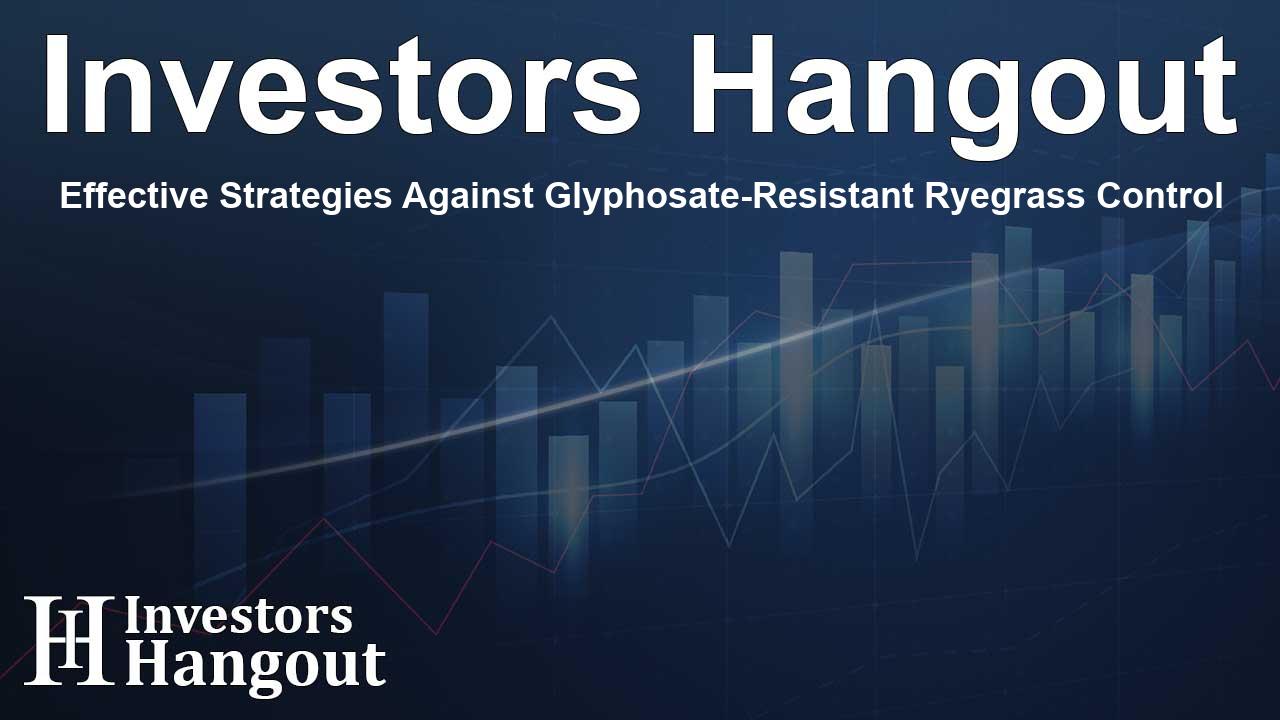Effective Strategies Against Glyphosate-Resistant Ryegrass Control

Seasonal Herbicide Applications for Ryegrass Control
Recent research highlights the critical role of fall-applied residual herbicides in managing glyphosate-resistant Italian ryegrass. Understanding strategies to combat these stubborn weeds is vital for agricultural success, particularly in rice production.
The Challenges of Glyphosate-Resistant Weeds
Glyphosate-resistant Italian ryegrass is a significant challenge for crop producers. Effective management requires innovative approaches to ensure healthy yields. Research indicates that the application of residual herbicides in the fall can greatly enhance weed control measures.
Research Insights from Mississippi
Jason A. Bond, an Extension/Research Professor at Mississippi State University, emphasizes the importance of a comprehensive management strategy. He states, "The most effective and economical management strategy involves preemergence followed by postemergence herbicide applications for controlling glyphosate-resistant Italian ryegrass.” This is particularly crucial in regions where these weeds are prevalent.
Field Studies Showcase Efficacy
Recent studies conducted at Mississippi State University evaluated various herbicide applications. These studies assessed both fall-applied residual herbicide mixtures and sequential herbicide programs. This enabled researchers to determine the most effective approaches for managing ryegrass effectively.
Key Findings from the Herbicide Mixture Study
The Herbicide Mixture Study revealed significant findings; mixtures containing dimethenamid-P, pyroxasulfone, and S-metolachlor achieved over 94% control of glyphosate-resistant ryegrass within 21 days after application. This shows the effectiveness of using multiple herbicide types to tackle this resistant weed.
Essential Herbicides for Control
In the Sequential Herbicide Application Study, results showed that treatments using fall-applied dimethenamid-P performed better than those relying on acetochlor alone. This distinction underlines the critical role of choosing the right herbicides to maximize control efforts.
Implications for Rice Production
For farmers, applying these herbicides during the fall or early spring is crucial. This timeline helps reduce unwanted vegetation at the time of rice seeding, which is vital for establishing a robust crop stand. Timely herbicide applications are essential for effective weed management.
The Importance of Residual Herbicides
The research underscores that without fall-applied residual herbicides, control measures become significantly less effective. According to Bond, the absence of a suitable residual herbicide can lead to reduced efficacy of other treatments targeting glyphosate-resistant ryegrass.
Looking Ahead: Future of Weed Management
Continued research is essential to enhance our understanding of glyphosate-resistant ryegrass management. As new challenges arise, developing innovative strategies and adapting existing practices will be crucial for agricultural sustainability.
Frequently Asked Questions
What is glyphosate-resistant Italian ryegrass?
Glyphosate-resistant Italian ryegrass is a weed that has developed resistance to glyphosate herbicides, complicating weed management in agriculture.
Why are fall-applied residual herbicides important?
They effectively control resistant weeds, ensuring that crops can establish properly without significant interference from competition.
What studies were conducted to evaluate herbicides?
Research at Mississippi State University focused on both herbicide mixtures and sequential application methods for managing glyphosate-resistant ryegrass.
How effective were the herbicide mixtures tested?
The tested mixtures achieved over 94% control of glyphosate-resistant ryegrass within 21 days, demonstrating their efficacy in weed management strategies.
What should farmers consider for successful weed management?
Farmers should evaluate their herbicide choices and application timing to develop a comprehensive strategy against resistant weed species.
About The Author
Contact Dylan Bailey privately here. Or send an email with ATTN: Dylan Bailey as the subject to contact@investorshangout.com.
About Investors Hangout
Investors Hangout is a leading online stock forum for financial discussion and learning, offering a wide range of free tools and resources. It draws in traders of all levels, who exchange market knowledge, investigate trading tactics, and keep an eye on industry developments in real time. Featuring financial articles, stock message boards, quotes, charts, company profiles, and live news updates. Through cooperative learning and a wealth of informational resources, it helps users from novices creating their first portfolios to experts honing their techniques. Join Investors Hangout today: https://investorshangout.com/
The content of this article is based on factual, publicly available information and does not represent legal, financial, or investment advice. Investors Hangout does not offer financial advice, and the author is not a licensed financial advisor. Consult a qualified advisor before making any financial or investment decisions based on this article. This article should not be considered advice to purchase, sell, or hold any securities or other investments. If any of the material provided here is inaccurate, please contact us for corrections.
